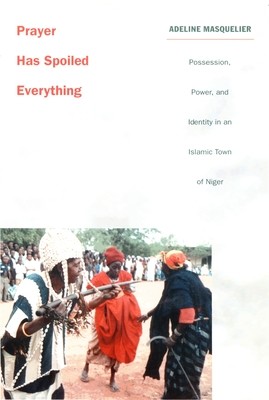
- We will send in 10–14 business days.
- Author: Adeline Masquelier
- Publisher: Duke University Press
- ISBN-10: 0822326396
- ISBN-13: 9780822326397
- Format: 15.6 x 23.4 x 2 cm, softcover
- Language: English
- SAVE -10% with code: EXTRA
Reviews
Description
Bori, in the Mawri society of Niger, are mischievous and invisible beings that populate the bush. Bori is also the practice of taming these wild forces in the context of possession ceremonies. In Prayer Has Spoiled Everything Adeline Masquelier offers an account of how this phenomenon intervenes-sometimes subtly, sometimes dramatically-in human lives, providing a constantly renewed source of meaning for Mawri peasants confronted with cultural contradictions and socio-economic marginalization.
To explore the role of bori possession in local definitions of history, power, and identity, Masquelier spent a total of two years in Niger, focusing on the diverse ways in which spirit mediums share, transform, and contest a rapidly changing reality, threatened by Muslim hegemony and financial hardship. She explains how the spread of Islam has provoked irreversible change in the area and how prayer-a conspicuous element of daily life that has become virtually synonymous with Islamic practice in this region of west Africa-has thus become equated with the loss of tradition. By focusing on some of the creative and complex ways that bori at once competes with and borrows from Islam, Masquelier reveals how possession nonetheless remains deeply embedded in Mawri culture, representing more than simple resistance to Islam, patriarchy, or the state. Despite a widening gap between former ways of life and the contradictions of the present, it maintains its place as a feature of daily life in which villagers participate with varying degrees of enthusiasm and approval.
Specialists in African studies, in the anthropology of religion, and in the historical transformations of colonial and postcolonial societies will welcome this study.
EXTRA 10 % discount with code: EXTRA
The promotion ends in 18d.14:33:36
The discount code is valid when purchasing from 10 €. Discounts do not stack.
- Author: Adeline Masquelier
- Publisher: Duke University Press
- ISBN-10: 0822326396
- ISBN-13: 9780822326397
- Format: 15.6 x 23.4 x 2 cm, softcover
- Language: English English
Bori, in the Mawri society of Niger, are mischievous and invisible beings that populate the bush. Bori is also the practice of taming these wild forces in the context of possession ceremonies. In Prayer Has Spoiled Everything Adeline Masquelier offers an account of how this phenomenon intervenes-sometimes subtly, sometimes dramatically-in human lives, providing a constantly renewed source of meaning for Mawri peasants confronted with cultural contradictions and socio-economic marginalization.
To explore the role of bori possession in local definitions of history, power, and identity, Masquelier spent a total of two years in Niger, focusing on the diverse ways in which spirit mediums share, transform, and contest a rapidly changing reality, threatened by Muslim hegemony and financial hardship. She explains how the spread of Islam has provoked irreversible change in the area and how prayer-a conspicuous element of daily life that has become virtually synonymous with Islamic practice in this region of west Africa-has thus become equated with the loss of tradition. By focusing on some of the creative and complex ways that bori at once competes with and borrows from Islam, Masquelier reveals how possession nonetheless remains deeply embedded in Mawri culture, representing more than simple resistance to Islam, patriarchy, or the state. Despite a widening gap between former ways of life and the contradictions of the present, it maintains its place as a feature of daily life in which villagers participate with varying degrees of enthusiasm and approval.
Specialists in African studies, in the anthropology of religion, and in the historical transformations of colonial and postcolonial societies will welcome this study.


Reviews